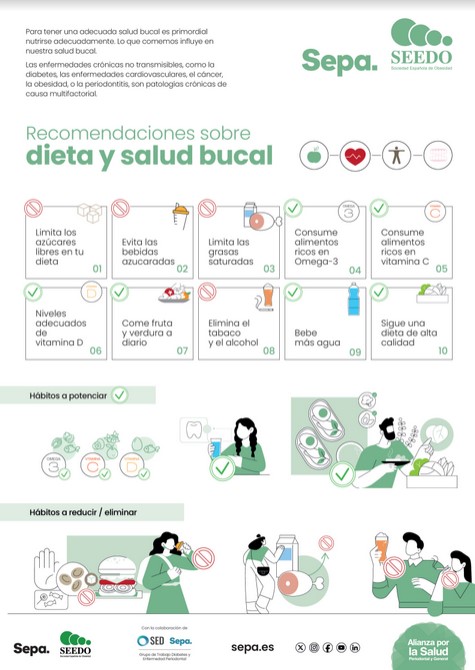Recommendations for dental health and diet

The connection between nutrition and oral health This is undeniable and vital to overall well-being. A balanced diet not only provides the nutrients needed to maintain healthy teeth and gums, but can also prevent oral diseases such as tooth decay and periodontitis, which have direct consequences for the health of the entire system. But the connection goes the other way around: good oral health contributes significantly to the overall health of the body.

To help maintain or improve the health of your mouth and, of course, your entire body, a new decalogue was recently introduced. The report was prepared by experts from Spanish Society of Periodontology (Sepa) in collaboration with Spanish Society for the Study of Obesity (SEEDO) – including periodontists, endocrinologists and obesity specialists – and verified by the working group “Diabetes and Periodontitis” of the Spanish Diabetes Society and the Spanish Society of Periodontology.
“Scientific evidence is growing on the relationship between diet and periodontal health, so we believe these simple recommendations can help both patients and professional oral health teams.”emphasizes Dr. Cristina Serrano, periodontist and coordinator of this Report. As he adds: “dentists and hygienists have the opportunity to have a very positive impact on the reduction and elimination of habits that are clearly harmful to health.”.
Ten tips for good health
Just as it happens with other chronic non-communicable diseases, Unbalanced diet negatively affects oral diseasesand, on the other hand, Poor oral health also negatively impacts your overall health..
In this situation, it is advisable to take a number basic nutritional measuresmany of them are already known, but which synthesized, scientifically substantiated and explained in simple language The report’s authors also provided useful information about the oral health effects of each proposed intervention. The recommendations are as follows:
1) Limit the amount of free sugars in your diet to 5-10% of your total energy intake.as recommended by WHO;
2) Avoid sugary drinkswhich include carbonated or non-carbonated soft drinks, fruit or vegetable juices, liquid and powder concentrates, flavored waters, energy and sports drinks, ready-to-drink teas and coffees or flavored milks;
3) Limit saturated fats;
4) Increase your intake of foods rich in omega-3 mono- and polyunsaturated fats.;
5) Eat foods rich in vitamin C.;
6) Maintain adequate vitamin D levels when eating fatty fish and eggs;
7) Eat fruits and vegetables of all colors daily for a source of antioxidants.;
8) Eliminate smoking and alcohol;
9) Drink more water;
10) And Eat a quality diet, such as the Mediterranean or Atlantic diet.which are beneficial for general and oral health.
